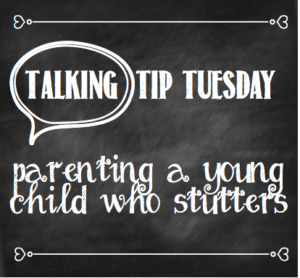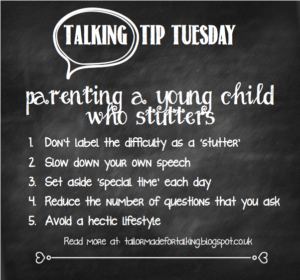Last week's Talking Tip Tuesday shared information with teachers about how to interact with their student who stutters. Today's Talking Tip Tuesday is for parents of preschool aged children who stutter (also known as 'stammering' in the UK).
Between the ages of two and four, 1 in 20 children will have difficulties talking fluently. Current evidence shows that many of these children will outgrow this phase within a few weeks or months. It important to understand that parents do not cause stuttering and as a parent you should never feel that it is your fault if your child develops a stutter.
If you notice that your little one is getting stuck on on words or repeating words and sounds, there are some tips that you can follow to help. These tips have been adapted from the British Stammering Association's recommendations.
1. Don't label the difficulty as a 'stutter' or 'stammer'
If you feel that it is appropriate, you can acknowledge the difficulty that your child is having with their speech in a non critical way. For example, you can talk about it in the same way that you would address your child when they trip or spill something. Avoid labelling the difficulty as a 'stutter' or 'stammer.' Use child friendly language and talk about 'bumpy speech' or 'getting stuck.' You can even ask your child to describe the difficulty in their own words. If your child feels bad about their speech, give them encouragement just as you would with any other difficulty that they have. For example, you may say 'Don't worry! Talking can be hard sometimes when you are still learning.'
2. Slow down your own speech
Telling your child to 'slow down' or to 'take a breath' can be unhelpful if your child is struggling with their speech. Instead, model slow speech yourself, pausing at natural points in your sentence. You can also wait a moment before responding or asking questions. Modelling a non-rushed manner of speaking can help your child to naturally speak slower, take breaths and pause before speaking.
3. Set aside 'special time' each day
Set aside a short amount of time each day when you give your child your undivided attention in a relaxed and calm atmosphere. Follow your child's lead if playing, or talk about something that they enjoy. Try to talk about things in the here and now rather than in the past or future. This will reduce the cognitive demands on your child.
4. Reduce the number of questions that you ask
It can be hard not to load your child with one question after another, however it is important to make an effort to ask less questions. Answering a question about your day at the age of 3 requires a much higher cognitive load than at the age of 30. So, always give your child plenty of time to answer your question before asking another question. Better yet, make a comment on what they have just said, rather than following up with another question. Giving your child lots of time to answer will help them to feel less rushed. Commenting on what they have said will demonstrate that you are listening to what they have said.
5. Avoid a hectic lifestyle
Children who stutter tend to respond well to routines and structured environments at home and at preschool/nursery. It is also helpful to establish regular sleep patterns and a healthy diet. Stuttering can often become worse when the child is tired.
If your child's stutter persists, it is important to refer your child to a Speech and Language Pathologist/Therapist as soon as possible. Evidence suggests that therapy is more effective when delivered before the age of 5. Contact your local Speech and Language Therapist for an assessment if you are concerned.



